
brown on green, A Regular column about finances
by David Brown
Teaching Kids to Handle Money
Teaching children how to handle money is one of the most important responsibilities we have as parents. Often it is also one of the most difficult duties. Perhaps we fear we have not done a great job ourselves and feel inadequate to teach others; but we must accept this responsibility for the good of our children.
Kids need to understand how a budget works. Older children, especially teenagers are old enough to grasp this concept. A great way to teach this is to give them a budget for buying their Christmas gifts. Give them a maximum amount for all their Christmas gifts. Using this budget, they can put several smaller gifts on their wish list or ask for one large gift.
Another way to demonstrate a budget is to assign an amount for back-to-school clothing. This budget can be designed with incentives. For instance, tell your child that he or she can keep whatever they don’t spend. This is a very important concept for kids to understand because this will translate to adulthood. When we set a family budget, our incentive for sticking to the budget is that we can give, spend, save, or invest the leftover money.
Using a school clothes budget also helps you deal with arguments over expensive shoes or designer clothes. When kids know they can keep what’s left of the budget, those costly items are not as attractive as they were before. They also face decisions about how many outfits they can buy.
Set a budget that will allow them to buy seven reasonably priced outfits. They can choose to buy more expensive clothes, but they should be informed that if all they bring home are three or four outfits, they will be responsible for washing them, and a portion of their allowance will be taken to pay for detergent and water.
They will also learn the importance of sale items as they shop. An enterprising teenager may decide to go to a thrift store and purchase used clothes for a bargain and pocket the cash (or better yet, save it for college).
These lessons can have a lifelong effect on spending decisions. We are all held accountable to God and society for how we raise our children. I encourage you to teach your children how to handle finances. They will thank you for it.

A Note About Natural Disasters
Many people
in recent days have suffered severe losses
as a result of
natural
disasters. Tornados in Oklahoma and historic flooding in middle Tennessee have impacted many Free Will Baptists. If your county has been declared a federal disaster area, you can file an amended 2009 federal tax return (1040X).
The tax laws will allow you to submit your 2010 casualty loss on schedule A of your amended 2009 return. Individuals in federal disaster areas do not have to reduce the loss using 10% of adjusted gross income (AGI). However any insurance or federal help must be deducted from your losses to determine your unrecovered casualty loss.
Brown on Green is a regular column written by Free Will Baptist Foundation Director David Brown. The column offers financial advice, addresses hot-button business topics, and answers your finance questions. Contact David with your questions.
|

